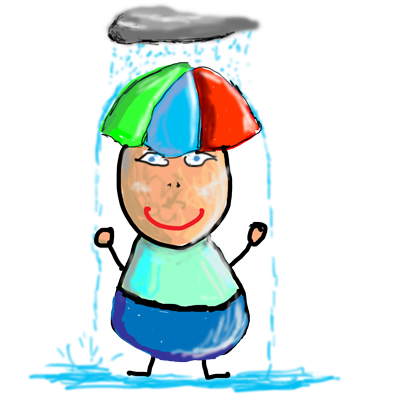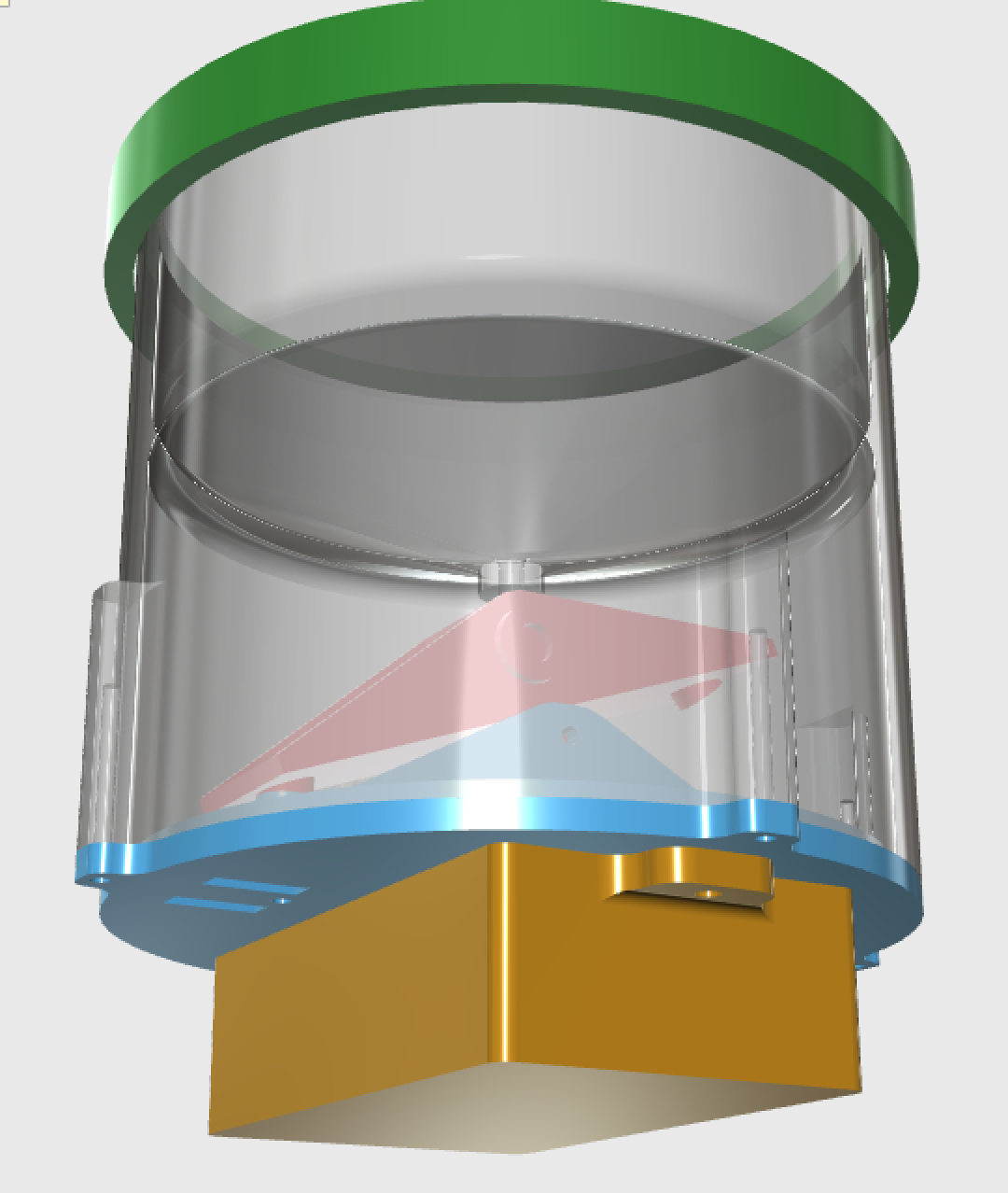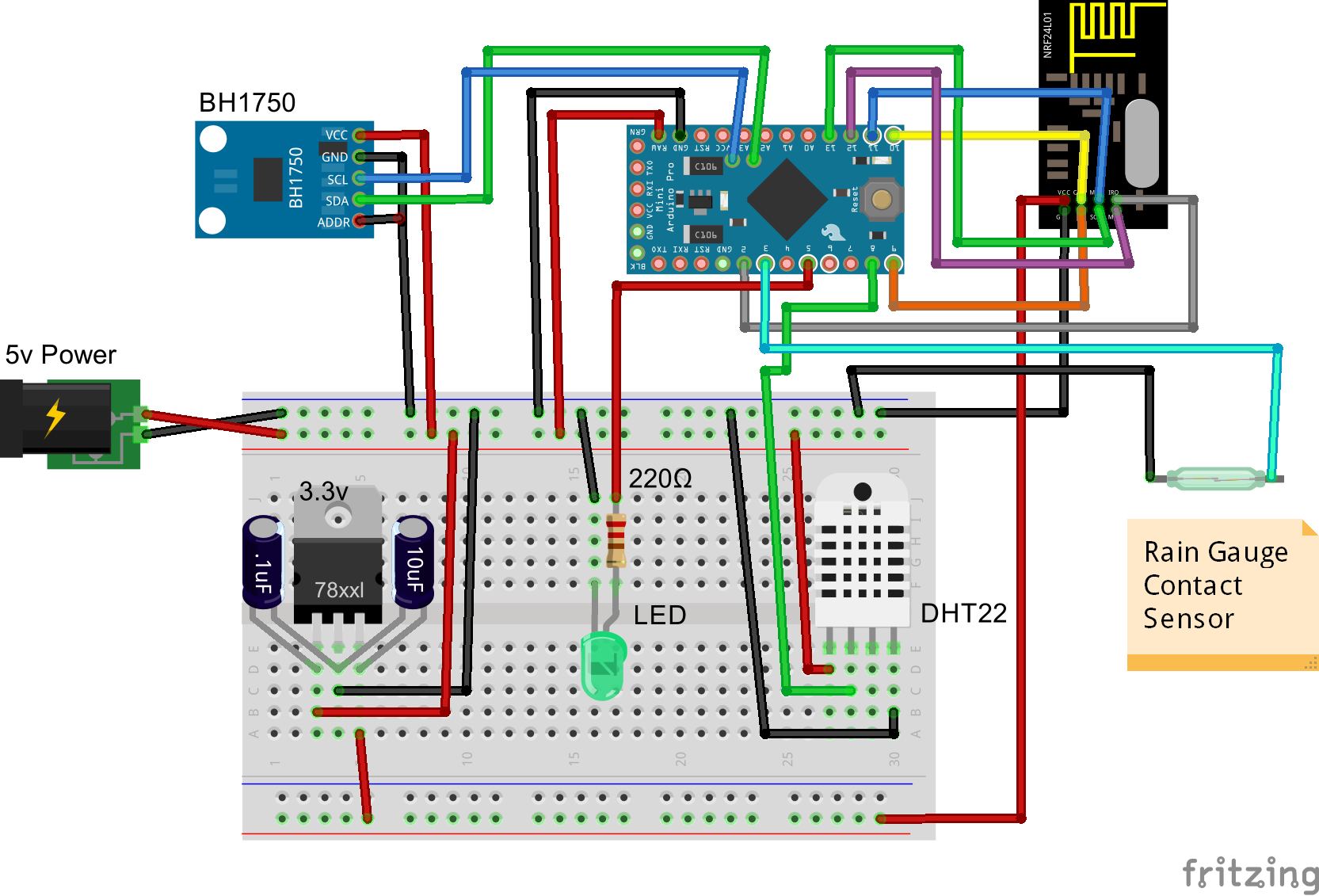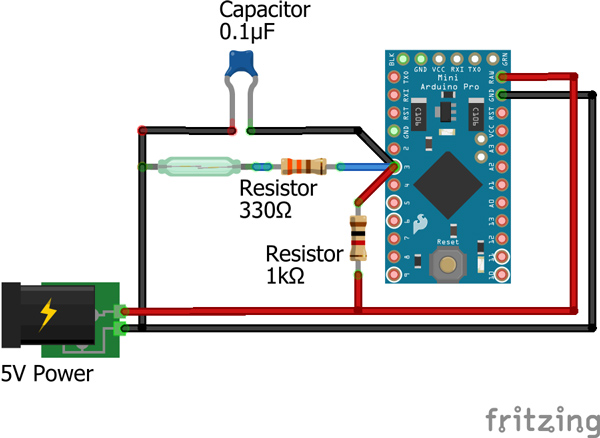

Here you will learn how to make your own wireless "tipping bucket" rain sensor. You can either print the 3D model yourself or MySensorize some cheap tipping bucket hardware found below.
The principle behind this is quite simple; When it rains a funnel collects water into two tiny "buckets". When one bucket is full it tips out the water and the second bucket starts to fill up. Each tip is registered and this data is transmitted to your controller.
By measuring the funnel opening and bucket size you can calculate the amount of rain that has fallen. Need help calculate your own funnel construction? Have a look here.
The DIY tipping bucket 3D model created by BulldogLowell can be found here.
The example also contains some optional light, humidity and temperature sensors that can be removed if you want to keep it simple.
Big thanks to BulldogLowell and PeteWill for creating and documenting this great project. You can read the background story on the forum.
Note: If you are using a Vera home automation controller you can find the required files here: https://github.com/mysensors/Vera/tree/master/raingauge
Demonstration
A video showing how to setup your own rain gauge.
Wiring Things Up

Parts
- Prototype Universal Printed Circuit Boards (PCB)
- NRF24L01 Radio
- Arduino (Pro Mini was used in the example video)
- FTDI USB to TTL Serial Adapter (if using a Pro Mini)
- Rain Gauge (Tipping bucket)
- Capacitors (10uf and .1uf)
- 3.3v voltage regulator
- Resistor (270 Ω)
- Female Dupont Cables
- Male Dupont Cables
- Male Pin Header Connector Strip
- Female Pin Header Connector Strip
- LED
- 2 Pole 5mm Pitch PCB Mount Screw Terminal Block
- 22-24 gauge wire or similar (I used Cat5/Cat6 cable)
- DHT-22 (optional) - humidity/temp sensor
- BH1750 (optional) - light sensor
Example
/*
Arduino Tipping Bucket Rain Gauge
October 6, 2017
Version 2.1
Arduino Tipping Bucket Rain Gauge
Utilizing a tipping bucket sensor, your Vera home automation controller and the MySensors.org
gateway you can measure and sense local rain. This sketch will create two devices on your
Vera controller. One will display your total precipitation for the last 5 days. The other,
a sensor that changes state if there is recent rain (up to last 120 hours) above a threshold.
Both these settings are user definable.
There is a build overview video here: https://youtu.be/1eMfKQaLROo
This sketch features the following:
* Allows you to set the rain threshold in mm
* Allows you to determine the tripped indicator window up to 120 hours.
* Displays the last 5 days of rain in Variable1 through Variable5
of the Rain Sensor device
* Configuration changes to Sensor device updated every hour
* Should run on any Arduino
* Will retain Tripped/Not Tripped status and data in a power interruption, saving small amount
of data to EEPROM (Circular Buffer to maximize life of EEPROM)
* LED status indicator
* Optional Temp/Humidity (DHT-22 or DHT-11) and Light LUX (BH1750) sensors. To use, uncomment
#define DHT_ON and/or #define LUX_ON
* Optionally send total accumulation of each day's rainfall or send only individual days rainfall totals.
Uncomment #define USE_DAILY to display individual daily rainfall. If it is commented out it will display
a cumulative total rainfall (day4 = day1+day2+day3+day4 etc)
by @BulldogLowell and @PeteWill for free public use
Change Log
2017-10-06 - Version 2.1 - Updated variable types to optimize bytes used and fixed rainBucket array size issue
*/
//#define MY_DEBUG // Enable MySensors debug prints to serial monitor
// Enable and select radio type attached
#define MY_RADIO_RF24
//#define MY_RADIO_RFM69
//#define MY_RF24_PA_LEVEL RF24_PA_MAX //Options: RF24_PA_MIN, RF24_PA_LOW, RF24_PA_HIGH, RF24_PA_MAX
//#define MY_NODE_ID 7 //uncomment this line to assign a static ID
#include <math.h>
#include <TimeLib.h>
#include <MySensors.h>
#define SKETCH_NAME "Rain Gauge"
#define SKETCH_VERSION "2.1"
#define DWELL_TIME 40 // this allows for radio to come back to power after a transmission, ideally 0
//#define DEBUG_ON // Rain gauge specific debug messages.
#define DHT_ON // uncomment out this line to enable DHT sensor
#define LUX_ON // uncomment out this line to enable BH1750 sensor
//#define USE_DAILY // Uncomment to display individual daily rainfall totals in the variables sent to your controller. If it's commented it will add each day to the next for a cumulative total.
#define TIP_SENSOR_PIN 3
#define CALIBRATE_FACTOR 60 // amount of rain per rain bucket tip e.g. 5 is .05mm
#define DHT_LUX_DELAY 300000 //Delay in milliseconds that the DHT and LUX sensors will wait before sending data
#define CHILD_ID_RAIN_LOG 3 // Keeps track of accumulated rainfall
#define CHILD_ID_TRIPPED_INDICATOR 4 // Indicates Tripped when rain detected
#define EEPROM_BUFFER_LOCATION 0 // location of the EEPROM circular buffer
#define E_BUFFER_LENGTH 240 //Max size = 254
#define RAIN_BUCKET_SIZE 120 //Max size = 254
#ifdef DEBUG_ON
#define DEBUG_PRINT(x) Serial.print(x)
#define DEBUG_PRINTLN(x) Serial.println(x)
#define SERIAL_START(x) Serial.begin(x)
#else
#define DEBUG_PRINT(x)
#define DEBUG_PRINTLN(x)
#define SERIAL_START(x)
#endif
//
MyMessage msgRainRate(CHILD_ID_RAIN_LOG, V_RAINRATE);
MyMessage msgRain(CHILD_ID_RAIN_LOG, V_RAIN);
//
MyMessage msgRainVAR1(CHILD_ID_RAIN_LOG, V_VAR1);
MyMessage msgRainVAR2(CHILD_ID_RAIN_LOG, V_VAR2);
MyMessage msgRainVAR3(CHILD_ID_RAIN_LOG, V_VAR3);
MyMessage msgRainVAR4(CHILD_ID_RAIN_LOG, V_VAR4);
MyMessage msgRainVAR5(CHILD_ID_RAIN_LOG, V_VAR5);
//
MyMessage msgTripped(CHILD_ID_TRIPPED_INDICATOR, V_TRIPPED);
MyMessage msgTrippedVar1(CHILD_ID_TRIPPED_INDICATOR, V_VAR1);
MyMessage msgTrippedVar2(CHILD_ID_TRIPPED_INDICATOR, V_VAR2);
//
#ifdef DHT_ON
#include <DHT.h>
#define CHILD_ID_HUM 0
#define CHILD_ID_TEMP 1
#define HUMIDITY_SENSOR_DIGITAL_PIN 8
DHT dht;
float lastTemp;
float lastHum;
bool metric = true;
MyMessage msgHum(CHILD_ID_HUM, V_HUM);
MyMessage msgTemp(CHILD_ID_TEMP, V_TEMP);
#endif
//
#ifdef LUX_ON
//BH1750 is connected to SCL (analog input A5) and SDA (analog input A4)
#include <BH1750.h>
#include <Wire.h>
#define CHILD_ID_LIGHT 2
BH1750 lightSensor;
MyMessage msg(CHILD_ID_LIGHT, V_LIGHT_LEVEL);
uint16_t lastlux;
uint8_t heartbeat = 10; //Used to send the light lux to gateway as soon as the device is restarted and after the DHT_LUX_DELAY has happened 10 times
#endif
unsigned long sensorPreviousMillis;
uint8_t eepromIndex;
uint8_t tipSensorPin = 3; // Pin the tipping bucket is connected to. Must be interrupt capable pin
uint8_t ledPin = 5; // Pin the LED is connected to. PWM capable pin required
#ifdef DEBUG_ON
unsigned long dataMillis;
unsigned long serialInterval = 600000UL;
#endif
const unsigned long oneHour = 3600000UL;
unsigned long lastTipTime;
unsigned long lastRainTime; //Used for rainRate calculation
uint16_t rainBucket [RAIN_BUCKET_SIZE + 1]; /* 24 hours x 5 Days = 120 hours */
uint16_t rainRate = 0;
uint8_t rainWindow = 72; //default rain window in hours. Will be overwritten with msgTrippedVar1.
volatile int wasTippedBuffer = 0;
uint16_t rainSensorThreshold = 50; //default rain sensor sensitivity in hundredths. Will be overwritten with msgTrippedVar2.
uint8_t state = 0;
uint8_t oldState = 2; //Setting the default to something other than 1 or 0
uint16_t lastRainRate = 0;
uint16_t lastMeasure = 0;
bool gotTime = false;
uint8_t lastHour;
uint8_t currentHour;
//
void presentation() {
// Register all sensors to gw (they will be created as child devices)
sendSketchInfo(SKETCH_NAME, SKETCH_VERSION);
wait(DWELL_TIME);
present(CHILD_ID_RAIN_LOG, S_RAIN);
wait(DWELL_TIME);
present(CHILD_ID_TRIPPED_INDICATOR, S_MOTION);
wait(DWELL_TIME);
#ifdef DHT_ON
present(CHILD_ID_HUM, S_HUM);
wait(DWELL_TIME);
present(CHILD_ID_TEMP, S_TEMP);
wait(DWELL_TIME);
#endif
#ifdef LUX_ON
present(CHILD_ID_LIGHT, S_LIGHT_LEVEL);
#endif
DEBUG_PRINTLN(F("Sensor Presentation Complete"));
}
void setup()
{
#ifndef MY_DEBUG
SERIAL_START(115200); //Start serial if MySensors debugging isn't enabled
#endif
//
// Set up the IO
pinMode(TIP_SENSOR_PIN, INPUT_PULLUP);
attachInterrupt (digitalPinToInterrupt(TIP_SENSOR_PIN), sensorTipped, FALLING); // depending on location of the hall effect sensor may need CHANGE
pinMode(ledPin, OUTPUT);
digitalWrite(ledPin, HIGH);
//
//Sync time with the server
//
unsigned long functionTimeout = millis();
while (timeStatus() == timeNotSet && millis() - functionTimeout < 30000UL)
{
requestTime();
DEBUG_PRINTLN(F("Getting Time"));
wait(1000); // call once per second
DEBUG_PRINTLN(F("."));
}
currentHour = hour();
lastHour = hour();
//
//retrieve from EEPROM stored values on a power cycle.
//
bool isDataOnEeprom = false;
for (uint8_t i = 0; i < E_BUFFER_LENGTH; i++)
{
uint8_t locator = loadState(EEPROM_BUFFER_LOCATION + i);
if (locator == 0xFE) // found the EEPROM circular buffer index
{
eepromIndex = EEPROM_BUFFER_LOCATION + i;
DEBUG_PRINT(F("EEPROM Index "));
DEBUG_PRINTLN(eepromIndex);
//Now that we have the buffer index let's populate the rainBucket[] with data from eeprom
loadRainArray(eepromIndex);
isDataOnEeprom = true;
break;
}
}
//
if (!isDataOnEeprom) // Added for the first time it is run on a new Arduino
{
DEBUG_PRINTLN(F("I didn't find valid EEPROM Index, so I'm writing one to location 0"));
eepromIndex = EEPROM_BUFFER_LOCATION;
saveState(eepromIndex, 0xFE);
saveState(eepromIndex + 1, 0xFE);
//then I will clear out any bad data
for (uint8_t i = 2; i <= E_BUFFER_LENGTH; i++)
{
saveState(i, 0x00);
}
}
#ifdef DEBUG_ON
dataMillis = millis();
#endif
lastTipTime = millis();
//
request(CHILD_ID_TRIPPED_INDICATOR, V_VAR1);
wait(DWELL_TIME);
request(CHILD_ID_TRIPPED_INDICATOR, V_VAR2);
wait(DWELL_TIME);
//
#ifdef DHT_ON
dht.setup(HUMIDITY_SENSOR_DIGITAL_PIN);
metric = getControllerConfig().isMetric;
wait(DWELL_TIME);
#endif
//
#ifdef LUX_ON
lightSensor.begin();
#endif
//
transmitRainData(); //Setup complete send any data loaded from eeprom to gateway
}
void loop()
{
if (state)
{
prettyFade(); // breathe if tripped
}
else
{
slowFlash(); // blink if not tripped
}
#ifdef DEBUG_ON // Serial Debug Block
if ( (millis() - dataMillis) >= serialInterval)
{
for (int i = 24; i <= 120; i = i + 24)
{
updateSerialData(i);
}
dataMillis = millis();
}
#endif
//
// let's constantly check to see if the rain in the past rainWindow hours is greater than rainSensorThreshold
//
uint16_t measure = 0; // Check to see if we need to show sensor tripped in this block
for (uint8_t i = 0; i < rainWindow; i++)
{
measure += rainBucket [i];
if (measure != lastMeasure)
{
// DEBUG_PRINT(F("measure value (total rainBucket within rainWindow): "));
// DEBUG_PRINTLN(measure);
lastMeasure = measure;
}
}
//
state = (measure >= (rainSensorThreshold * 100));
if (state != oldState)
{
send(msgTripped.set(state));
wait(DWELL_TIME);
DEBUG_PRINT(F("New Sensor State... Sensor: "));
DEBUG_PRINTLN(state ? "Tripped" : "Not Tripped");
oldState = state;
}
//
unsigned long tipDelay = millis() - lastRainTime;
if (wasTippedBuffer) // if was tipped, then update the 24hour total and transmit to Vera
{
DEBUG_PRINTLN(F("Sensor Tipped"));
DEBUG_PRINT(F("rainBucket [0] value: "));
DEBUG_PRINTLN(rainBucket [0]);
send(msgRain.set((float)rainTotal(currentHour) / 100, 1)); //Calculate the total rain for the day
wait(DWELL_TIME);
wasTippedBuffer--;
rainRate = ((oneHour) / tipDelay);
if (rainRate != lastRainRate)
{
send(msgRainRate.set(rainRate, 1));
wait(DWELL_TIME);
DEBUG_PRINT(F("RainRate= "));
DEBUG_PRINTLN(rainRate);
lastRainRate = rainRate;
}
lastRainTime = lastTipTime;
}
//
currentHour = hour();
if (currentHour != lastHour)
{
DEBUG_PRINTLN(F("One hour elapsed."));
send(msgRain.set((float)rainTotal(currentHour) / 100, 1)); // send today's rainfall
wait(DWELL_TIME);
saveState(eepromIndex, highByte(rainBucket[0]));
saveState(eepromIndex + 1, lowByte(rainBucket[0]));
DEBUG_PRINT(F("Saving rainBucket[0] to eeprom. rainBucket[0] = "));
DEBUG_PRINTLN(rainBucket[0]);
for (int16_t i = RAIN_BUCKET_SIZE - 1; i >= 0; i--)//cascade an hour of values back into the array
{
rainBucket [i + 1] = rainBucket [i];
}
request(CHILD_ID_TRIPPED_INDICATOR, V_VAR1);
wait(DWELL_TIME);
request(CHILD_ID_TRIPPED_INDICATOR, V_VAR2);
wait(DWELL_TIME);
rainBucket[0] = 0;
eepromIndex = eepromIndex + 2;
if (eepromIndex > EEPROM_BUFFER_LOCATION + E_BUFFER_LENGTH)
{
eepromIndex = EEPROM_BUFFER_LOCATION;
}
DEBUG_PRINT(F("Writing to EEPROM. Index: "));
DEBUG_PRINTLN(eepromIndex);
saveState(eepromIndex, 0xFE);
saveState(eepromIndex + 1, 0xFE);
requestTime(); // sync the time every hour
wait(DWELL_TIME);
transmitRainData();
rainRate = 0;
send(msgRainRate.set(rainRate, 1));
wait(DWELL_TIME);
DEBUG_PRINTLN(F("Sending rainRate is 0 to controller"));
lastHour = hour();
}
if (millis() - sensorPreviousMillis > DHT_LUX_DELAY)
{
#ifdef DHT_ON //DHT Code
doDHT();
#endif
#ifdef LUX_ON
doLUX();
#endif
sensorPreviousMillis = millis();
}
}
//
#ifdef DHT_ON
void doDHT(void)
{
float temperature = dht.getTemperature();
if (isnan(temperature))
{
DEBUG_PRINTLN(F("Failed reading temperature from DHT"));
} else if (temperature != lastTemp)
{
lastTemp = temperature;
if (!metric)
{
temperature = dht.toFahrenheit(temperature);
}
send(msgTemp.set(temperature, 1));
wait(DWELL_TIME);
DEBUG_PRINT(F("Temperature is: "));
DEBUG_PRINTLN(temperature);
}
float humidity = dht.getHumidity();;
if (isnan(humidity))
{
DEBUG_PRINTLN(F("Failed reading humidity from DHT"));
} else if (humidity != lastHum)
{
lastHum = humidity;
send(msgHum.set(humidity, 1));
wait(DWELL_TIME);
DEBUG_PRINT(F("Humidity is: "));
DEBUG_PRINTLN(humidity);
}
}
#endif
//
#ifdef LUX_ON
void doLUX(void)
{
uint16_t lux = lightSensor.readLightLevel();// Get Lux value
DEBUG_PRINT(F("Current LUX Level: "));
DEBUG_PRINTLN(lux);
heartbeat++;
if (lux != lastlux || heartbeat > 10)
{
send(msg.set(lux));
lastlux = lux;
}
if (heartbeat > 10)
{
heartbeat = 0;
}
}
#endif
//
void sensorTipped()
{
unsigned long thisTipTime = millis();
if (thisTipTime - lastTipTime > 100UL)
{
rainBucket[0] += CALIBRATE_FACTOR; // adds CALIBRATE_FACTOR hundredths of unit each tip
wasTippedBuffer++;
}
lastTipTime = thisTipTime;
}
//
uint32_t rainTotal(uint8_t hours)
{
uint32_t total = 0;
for (uint8_t i = 0; i <= hours; i++)
{
total += rainBucket [i];
}
return total;
}
#ifdef DEBUG_ON
void updateSerialData(int x)
{
DEBUG_PRINT(F("Rain last "));
DEBUG_PRINT(x);
DEBUG_PRINTLN(F(" hours: "));
float tipCount = 0;
for (uint8_t i = 0; i < x; i++)
{
tipCount = tipCount + rainBucket [i];
}
tipCount = tipCount / 100;
DEBUG_PRINTLN(tipCount);
}
#endif
void loadRainArray(int16_t eValue) // retrieve stored rain array from EEPROM on powerup
{
for (uint8_t i = 1; i < RAIN_BUCKET_SIZE; i++)
{
eValue = eValue - 2;
if (eValue < EEPROM_BUFFER_LOCATION)
{
eValue = EEPROM_BUFFER_LOCATION + E_BUFFER_LENGTH;
}
DEBUG_PRINT(F("EEPROM location: "));
DEBUG_PRINTLN(eValue);
uint8_t rainValueHigh = loadState(eValue);
uint8_t rainValueLow = loadState(eValue + 1);
uint16_t rainValue = rainValueHigh << 8;
rainValue |= rainValueLow;
rainBucket[i] = rainValue;
//
DEBUG_PRINT(F("rainBucket[ value: "));
DEBUG_PRINT(i);
DEBUG_PRINT(F("] value: "));
DEBUG_PRINTLN(rainBucket[i]);
}
}
void transmitRainData(void)
{
DEBUG_PRINT(F("In transmitRainData. currentHour = "));
DEBUG_PRINTLN(currentHour);
int rainUpdateTotal = 0;
for (int8_t i = currentHour; i >= 0; i--)
{
rainUpdateTotal += rainBucket[i];
DEBUG_PRINT(F("Adding rainBucket["));
DEBUG_PRINT(i);
DEBUG_PRINTLN(F("] to rainUpdateTotal."));
}
DEBUG_PRINT(F("TX Day 1: rainUpdateTotal = "));
DEBUG_PRINTLN((float)rainUpdateTotal / 100.0);
send(msgRainVAR1.set((float)rainUpdateTotal / 100.0, 1)); //Send current day rain totals (resets at midnight)
wait(DWELL_TIME);
#ifdef USE_DAILY
rainUpdateTotal = 0;
#endif
for (uint8_t i = currentHour + 24; i > currentHour; i--)
{
rainUpdateTotal += rainBucket[i];
DEBUG_PRINT(F("Adding rainBucket["));
DEBUG_PRINT(i);
DEBUG_PRINTLN(F("] to rainUpdateTotal."));
}
DEBUG_PRINT(F("TX Day 2: rainUpdateTotal = "));
DEBUG_PRINTLN((float)rainUpdateTotal / 100.0);
send(msgRainVAR2.set((float)rainUpdateTotal / 100.0, 1));
wait(DWELL_TIME);
#ifdef USE_DAILY
rainUpdateTotal = 0;
#endif
for (uint8_t i = currentHour + 48; i > currentHour + 24; i--)
{
rainUpdateTotal += rainBucket[i];
DEBUG_PRINT(F("Adding rainBucket["));
DEBUG_PRINT(i);
DEBUG_PRINTLN(F("] to rainUpdateTotal."));
}
DEBUG_PRINT(F("TX Day 3: rainUpdateTotal = "));
DEBUG_PRINTLN((float)rainUpdateTotal / 100.0);
send(msgRainVAR3.set((float)rainUpdateTotal / 100.0, 1));
wait(DWELL_TIME);
#ifdef USE_DAILY
rainUpdateTotal = 0;
#endif
for (uint8_t i = currentHour + 72; i > currentHour + 48; i--)
{
rainUpdateTotal += rainBucket[i];
DEBUG_PRINT(F("Adding rainBucket["));
DEBUG_PRINT(i);
DEBUG_PRINTLN(F("] to rainUpdateTotal."));
}
DEBUG_PRINT(F("TX Day 4: rainUpdateTotal = "));
DEBUG_PRINTLN((float)rainUpdateTotal / 100.0);
send(msgRainVAR4.set((float)rainUpdateTotal / 100.0, 1));
wait(DWELL_TIME);
#ifdef USE_DAILY
rainUpdateTotal = 0;
#endif
for (uint8_t i = currentHour + 96; i > currentHour + 72; i--)
{
rainUpdateTotal += rainBucket[i];
DEBUG_PRINT(F("Adding rainBucket["));
DEBUG_PRINT(i);
DEBUG_PRINTLN(F("] to rainUpdateTotal."));
}
DEBUG_PRINT(F("TX Day 5: rainUpdateTotal = "));
DEBUG_PRINTLN((float)rainUpdateTotal / 100.0);
send(msgRainVAR5.set((float)rainUpdateTotal / 100.0, 1));
wait(DWELL_TIME);
}
void receive(const MyMessage &message)
{
if (message.sensor == CHILD_ID_RAIN_LOG)
{
// nothing to do here
}
else if (message.sensor == CHILD_ID_TRIPPED_INDICATOR)
{
if (message.type == V_VAR1)
{
rainWindow = atoi(message.data);
if (rainWindow > 120)
{
rainWindow = 120;
}
else if (rainWindow < 1)
{
rainWindow = 1;
}
if (rainWindow != atoi(message.data)) // if I changed the value back inside the boundries, push that number back to Vera
{
send(msgTrippedVar1.set(rainWindow));
}
}
else if (message.type == V_VAR2)
{
rainSensorThreshold = atoi(message.data);
if (rainSensorThreshold > 10000)
{
rainSensorThreshold = 10000;
}
else if (rainSensorThreshold < 1)
{
rainSensorThreshold = 1;
}
if (rainSensorThreshold != atoi(message.data)) // if I changed the value back inside the boundries, push that number back to Vera
{
send(msgTrippedVar2.set(rainSensorThreshold));
}
}
}
}
void prettyFade(void)
{
float val = (exp(sin(millis() / 2000.0 * PI)) - 0.36787944) * 108.0;
analogWrite(ledPin, val);
}
void slowFlash(void)
{
static bool ledState = true;
static unsigned long pulseStart = millis();
if (millis() - pulseStart < 100UL)
{
digitalWrite(ledPin, !ledState);
pulseStart = millis();
}
}
void receiveTime(unsigned long newTime)
{
DEBUG_PRINTLN(F("Time received..."));
setTime(newTime);
char theTime[6];
sprintf(theTime, "%d:%2d", hour(), minute());
DEBUG_PRINTLN(theTime);
}
Troubleshooting
A few people have reported issues with false interrupt triggers (rain reported on a sunny day). This has been traced back to bad power supplies. The quickest fix is to power this sensor with a good power supply and cable/wire. An alternative fix is to use hardware debouncing. To do this, use the following wiring on your contact sensor/reed switch.

If you use hardware debouncing change this line:
pinMode(TIP_SENSOR_PIN, INPUT_PULLUP);To this (the internal pullup resistor is no longer necessary):
pinMode(TIP_SENSOR_PIN, INPUT);